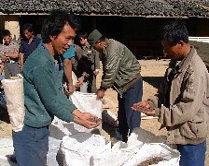 China is facing serious challenges to increasing farmers' income by 4 percent, as set out at the beginning of the year.
China is facing serious challenges to increasing farmers' income by 4 percent, as set out at the beginning of the year.
Yao Jingyuan, chief economist of the National Bureau of Statistics, said the SARS (severe acute respiratory syndrome) outbreak has had a major impact on farmers' wallets.
During the first half of this year, farm workers' per capita cash income stood at 1,158 yuan (US$139.3), a real increase of only 2.5 percent.
In the second quarter, when the SARS epidemic was at its peak, farmers' per capita income dropped by 35 yuan (US$4.2).
"This would affect farmers' income growth by 1 percentage point for the whole year," he said.
A quick survey on farmers from five provinces including Henan, Sichuan and Hunan, who returned home due to the SARS outbreak, suggests that by June 15, only 23.3 percent of farmers returned to work in cities.
"This will have further negative impacts on the growth of farmers' income," Yao said.
Xie Yang, a senior researcher with the State Council's Development Research Center said that in recent years, income earned by farm workers who found employment in cities accounted for about 70 percent of the increased income of the year.
SARS also had some impact on farmers' profits from sales of agricultural products, Xie said.
Farmers found they were unable to sell their products abroad, because foreign countries set technical barriers for Chinese-produced agricultural goods, he said.
The slow growth of farmers' income has long been a headache for the central government, because it greatly affected the implementation of policies to stimulate domestic demand, said Xie.
"If consumption in rural areas cannot be stimulated, the full expansion of domestic demands, a strong engine for economic growth, will not be realized," he said.
Presently, Chinese residents in rural areas, which account for more than two-thirds of the country's total population, contribute to only one-third of the total consumption.
"The slow income growth will hinder overall economic development and even undermine social stability," he said.
Yao said the central government has worked it all out and will continue to implement new measures to increase farmers' income.
For example, the government has speeded up the "tax-for-fees" reform in rural areas, thus increasing income for rural workers.
The government has also increased investment in agriculture and rural infrastructure, he said.
Governments at all levels have removed or will remove a series of barriers to make it easier for farmers to find jobs in cities.
(China Daily July 18, 2003)
|

